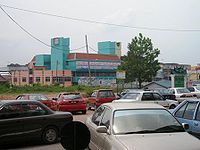
Bahau
Encyclopedia
Bahau is the principal town of Jempol
district, Negeri Sembilan
, Malaysia. The name Bahau is believed to have been derived from a Chinese phrase. Bahau is literally translated as "Horse's Mouth" while the nearby town, Mahsan means "Horse's Body" in Cantonese.

The town did not flourish until the arrival of Chinese settlers moving inland in search of tin ore. The Chinese settlers established the town of Bahau and nearby Mahsan, and the town grew as the rubber, palm oil and timber trade (fading industry) began to dominate the town's economy.
As for the schools, there are 14 tamil schools in the outskirts of Bahau. While, there are 2 main Chinese schools in the middle of the Bahau town.
In addition, industry in the town is also currently growing. Bahau's industrial area is located near Taman Kwang Hup. Car workshops, mechanics, spare-parts and accessories shops dominate the business in town because of the flourishing timber trade around the area. Hence, trailers and lorries usually frequent the town for repairs.
Jempol
Jempol is the largest district in the Malaysian state of Negeri Sembilan. The district borders another Malaysian state of Pahang to the northeast. Bandar Seri Jempol and Bahau are the principal towns in Jempol....
district, Negeri Sembilan
Negeri Sembilan
Negeri Sembilan, one of the 13 states that constitutes Malaysia, lies on the western coast of Peninsular Malaysia, just south of Kuala Lumpur and borders Selangor on the north, Pahang in the east, and Malacca and Johor to the south....
, Malaysia. The name Bahau is believed to have been derived from a Chinese phrase. Bahau is literally translated as "Horse's Mouth" while the nearby town, Mahsan means "Horse's Body" in Cantonese.

History
The earliest recorded role of the area around Bahau is as a town along the "Denai Penarikan" a water-land route through the interior of Peninsular Malaysia, linking Malacca in the West Coast, to Pekan, Pahang in the East Coast. The "Denai Penarikan" or the "Pulling Route" is a land route where merchants would pull their boats across land from Sungai Muar which flows westwards to Sungai Serting which flows eastwards.The town did not flourish until the arrival of Chinese settlers moving inland in search of tin ore. The Chinese settlers established the town of Bahau and nearby Mahsan, and the town grew as the rubber, palm oil and timber trade (fading industry) began to dominate the town's economy.
As for the schools, there are 14 tamil schools in the outskirts of Bahau. While, there are 2 main Chinese schools in the middle of the Bahau town.
Demographics
The population of Bahau is made up of mainly Chinese, Malays (from the Felda areas in the outskirts of the town) and Indians, who live in town and the estates on the outskirts.Road
Bahau is linked by federal and trunk roads to Kuala Pilah, Tampin and Gemas in Negeri Sembilan and Kemayan or Sg. Lui in Pahang.Train
Bahau is accessible by train, being one the major stations on the East Coast railway line, which stretches from Gemas in the south to Tumpat in the north. The railway station is situated near Taman Kwang HupTown Areas
Mahsan, Jelai and Rompin, in the outskirts of the town are a comfortable short distance drive from Bahau.Economy
The major source of income of the town of Bahau was timber industry which has contributed to the growth of the town in the past few decades. The cultivation of palm oil and rubber also had a significant impact on the town's economy and today, a prominent estate in the town are the IOI group, Sime Darby (Golden Hope), KLK and small holder is speeding up.In addition, industry in the town is also currently growing. Bahau's industrial area is located near Taman Kwang Hup. Car workshops, mechanics, spare-parts and accessories shops dominate the business in town because of the flourishing timber trade around the area. Hence, trailers and lorries usually frequent the town for repairs.

